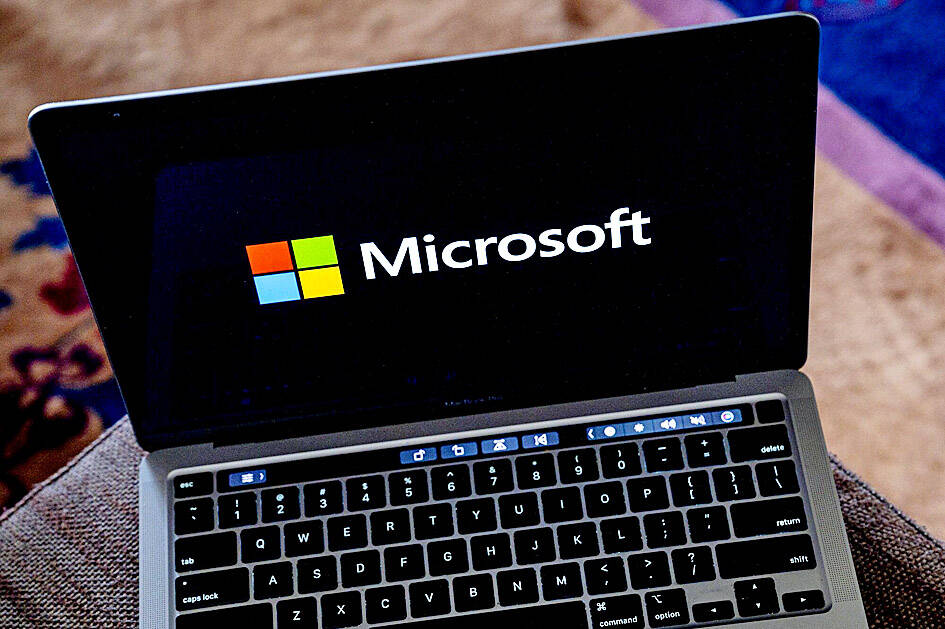Microsoft Corp is adding a button to the Windows keyboard to activate its artificial intelligence (AI) Copilot service, with the first devices to sport the new key available this month.
The Copilot key, which will sit to the right of the space bar, is the first change to the Windows keyboard layout since Microsoft added the Windows/Start key in 1994, underscoring the company’s commitment to AI.
Microsoft’s hardware partners will show off Windows 11 computers with the Copilot button over the coming days at the CES technology conference and, over time, it will become a required feature.

Photo: Bloomberg
The shortcut will help users create images, write emails and summarize text with the help of AI.
“AI will be seamlessly woven into Windows from the system, to the silicon, to the hardware,” Microsoft consumer chief marketing officer Yusuf Mehdi said in a blog announcing the change.
The Redmond, Washington-based company sees this year as “the year of the AI PC,” mirroring the budding trend among smartphone makers to tout their latest models as “AI phones” Mehdi said.
Those labels do not carry much weight by themselves, but Microsoft has spent the past year retooling its biggest products around AI tech that can generate new content from massive datasets.
That list now includes Windows, Office, Bing search, security software and customer and finance products. The work heavily leverages the GPT-4 technology from OpenAI, in which Microsoft has invested US$13 billion.
For device makers, Microsoft’s push into AI services has not yet translated into a boost for sales, as the novel Copilot features are being rolled out to new and existing devices alike. Mehdi’s promise of weaving AI into hardware and silicon may signal more pressure on consumers to upgrade as Microsoft evolves and improves its AI proposition.

Semiconductor business between Taiwan and the US is a “win-win” model for both sides given the high level of complementarity, the government said yesterday responding to tariff threats from US President Donald Trump. Home to the world’s largest contract chipmaker, Taiwan Semiconductor Manufacturing Co (TSMC, 台積電), Taiwan is a key link in the global technology supply chain for companies such as Apple Inc and Nvidia Corp. Trump said on Monday he plans to impose tariffs on imported chips, pharmaceuticals and steel in an effort to get the producers to make them in the US. “Taiwan and the US semiconductor and other technology industries

SMALL AND EFFICIENT: The Chinese AI app’s initial success has spurred worries in the US that its tech giants’ massive AI spending needs re-evaluation, a market strategist said Chinese artificial intelligence (AI) start-up DeepSeek’s (深度求索) eponymous AI assistant rocketed to the top of Apple Inc’s iPhone download charts, stirring doubts in Silicon Valley about the strength of the US’ technological dominance. The app’s underlying AI model is widely seen as competitive with OpenAI and Meta Platforms Inc’s latest. Its claim that it cost much less to train and develop triggered share moves across Asia’s supply chain. Chinese tech firms linked to DeepSeek, such as Iflytek Co (科大訊飛), surged yesterday, while chipmaking tool makers like Advantest Corp slumped on the potential threat to demand for Nvidia Corp’s AI accelerators. US stock

The US Federal Reserve is expected to announce a pause in rate cuts on Wednesday, as policymakers look to continue tackling inflation under close and vocal scrutiny from US President Donald Trump. The Fed cut its key lending rate by a full percentage point in the final four months of last year and indicated it would move more cautiously going forward amid an uptick in inflation away from its long-term target of 2 percent. “I think they will do nothing, and I think they should do nothing,” Federal Reserve Bank of St Louis former president Jim Bullard said. “I think the

‘LASER-FOCUSED’: Trump pledged tariffs on specific sectors, including semiconductors, pharmaceuticals, steel, copper and aluminum, and perhaps even cars US President Donald Trump said he wants to enact across-the-board tariffs that are “much bigger” than 2.5 percent, the latest in a string of signals that he is preparing widespread levies to reshape US supply chains. “I have it in my mind what it’s going to be but I won’t be setting it yet, but it’ll be enough to protect our country,” Trump told reporters on Monday night. Asked about a report that incoming US Secretary of the Treasury Scott Bessent favored starting with a global rate of 2.5 percent, Trump said he did not think Bessent supported that and would not